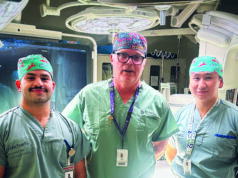
An investigator-sponsored clinical study conducted at the Mayo Clinic in Rochester, Minnesota, of the investigational Human Acellular Vessel (HAV) in patients with chronic limb-threatening ischemia (CLTI) was presented at the Midwestern Vascular Surgical Society (MVSS) annual meeting in Minneapolis, Minnesota (Sept. 7–9).
Delivered by Sebastian Cifuentes, MD, from the Department of Vascular and Endovascular Surgery at the Mayo Clinic, the researchers concluded that in the clinical study the HAV was a safe, resilient, and effective conduit for arterial bypass and limb salvage.
The presentation reported the outcomes of 29 patients—with a mean age of 71 who had no available vein to use as a bypass graft—who underwent HAV implantation. Of these patients, 97% had previously experienced unsuccessful revascularization procedures on the extremity and 21 (72%) had tissue loss or gangrene. Based on the state of this disease, this patient group had a 30–50% one-year risk of amputation. Notably, surgery in 22 (76%) patients necessitated a tibial artery target, a surgical procedure involving the fusion of two 42 cm long HAVs to achieve the required bypass length. The Mayo team, led by Todd Rasmussen, MD, reported that the operations to implant the HAV achieved a 100% technical success rate, without any HAV-related major adverse events reported. At a median follow-up of nine months, the secondary patency rate for patients implanted with the HAV was 72%. The limb salvage rate was 86%, corresponding to only a 14% amputation rate.
“In a complex cohort of patients with CLTI and no autologous options, the HAV is a safe and effective arterial bypass conduit,” Cifuentes reported at MVSS 2023. “This experience using the Food and Drug Administration (FDA) Expanded Access Program provides real-world data that can inform regulatory deliberations and future trials of the HAV. Further studies will evaluate the HAV as a first-line bypass conduit to define patency and limb-salvage potential in less severe cases of CLTI.”
The HAV, a bioengineered tissue, is under investigation as an infection-resistant alternative for revascularization. Designed to be ready off-the-shelf, the HAV has the potential to save valuable time for surgeons and to reduce discomfort and complications for patients. The HAV has accumulated more than 1,000 patient-years of experience worldwide in a series of clinical trials in multiple indications, including vascular trauma repair, arteriovenous access for hemodialysis, and PAD, Humacyte, the company behind the product, reports. The HAV is an investigational product and has not been approved for sale by the FDA or any other regulatory agency.
Meanwhile, Humacyte also recently announced positive top line results from its V005 Phase 2/3 trial of the Human Acellular Vessel (HAV) in vascular trauma repair. A company press release reported that the single-arm clinical trial was a success and showed that the HAV in this study had higher rates of patency, and lower rates of amputation and infection, compared to historic synthetic graft benchmarks. Humacyte plans to file a Biologics License Application (BLA) for the treatment of vascular trauma with the FDA during the fourth quarter of 2023.
The V005 trial was a single-arm study conducted in the U.S. and Israel in patients with arterial injuries resulting from gun shots, workplace injuries, car accidents, or other traumatic events. Patients enrolled in the study did not have the standard of care, saphenous vein, available to use as a bypass graft. As a result, had the patients not received the HAV, they likely would have been treated with synthetic grafts, ligation of the bleeding artery, and/or amputation.












